08 Apr – Preparing for the General Election
 CAFOD and the SVP have joined forces to help prepare the UK Catholic community for the upcoming General Election. Their introduction to this campaign is as follows:
CAFOD and the SVP have joined forces to help prepare the UK Catholic community for the upcoming General Election. Their introduction to this campaign is as follows:
The common good is reached when we work together to improve the lives of people both in our local community, and in the wider world.
The SVP’s and CAFOD’s campaign wants to help the Catholic voice be heard in the next General Election, and we want to make sure our politicians make tackling poverty a priority.
The Church tells us that “…All citizens ought to be aware of their right and duty to promote the common good by casting their votes…”. But in order to arrive at the polling station as well informed as possible, it’s important to know our prospective MP’s views on the things that matter to us.
For this reason, the SVP and CAFOD are inviting parishes to reach out to their local candidates ahead of the next election. This is not about party political affiliations, but rather about strengthening community participation as a local faith group, and practicing the culture of encounter that Pope Francis talks about:
“. . . with our faith we must create a “culture of encounter,” a culture of friendship, a culture in which we find brothers and sisters, in which we can also speak with those who think differently…”
You can register to receive more details and updates about training workshops that they are offering. Use the button to find out more.
SVP/CAFOD Encounter information

 For this reason, the SVP and CAFOD are inviting parishes to reach out to their local candidates ahead of the next election. This is not about party political affiliations, but rather about strengthening community participation as a local faith group, and practicing the culture of encounter that Pope Francis talks about:
For this reason, the SVP and CAFOD are inviting parishes to reach out to their local candidates ahead of the next election. This is not about party political affiliations, but rather about strengthening community participation as a local faith group, and practicing the culture of encounter that Pope Francis talks about: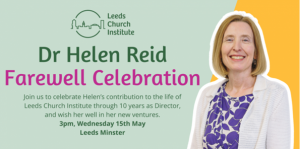

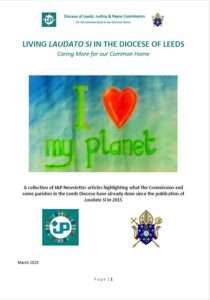 As an encouragement to parishes across the Diocese of Leeds we have produced a compilation of our newsletter articles about Climate Change since the publication of Pope Francis’ encyclical ‘Laudato Si‘.
As an encouragement to parishes across the Diocese of Leeds we have produced a compilation of our newsletter articles about Climate Change since the publication of Pope Francis’ encyclical ‘Laudato Si‘. On 14 March SPARK Social Justice and the J&P Commission, in partnership with Leeds Trinity University, had organised a presentation of the 2024 Romero Lecture. The Archbishop Romero Trust organises this event every year, taking a guest lecturer on a short UK-wide tour.
On 14 March SPARK Social Justice and the J&P Commission, in partnership with Leeds Trinity University, had organised a presentation of the 2024 Romero Lecture. The Archbishop Romero Trust organises this event every year, taking a guest lecturer on a short UK-wide tour.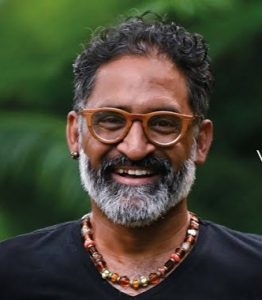 This year the speaker was Dr Raymond Perrier, Director of the Denis Hurley Institute in Durban, South Africa.
This year the speaker was Dr Raymond Perrier, Director of the Denis Hurley Institute in Durban, South Africa.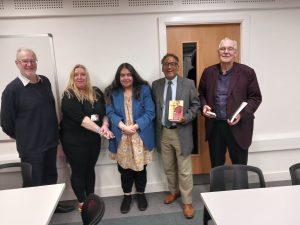


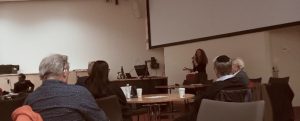 In reflecting on these, the speakers talked about why genocide has occurred so many times. Dr Becky Alexis-Martin spoke of imperialistic necropolitics: the entanglement of the use of power to “dictate how some people must live and some must die”, with imperialism and colonial legacies. As Professor Udy Archibong said, “racism, hatred and discrimination fuelled these genocides”.
In reflecting on these, the speakers talked about why genocide has occurred so many times. Dr Becky Alexis-Martin spoke of imperialistic necropolitics: the entanglement of the use of power to “dictate how some people must live and some must die”, with imperialism and colonial legacies. As Professor Udy Archibong said, “racism, hatred and discrimination fuelled these genocides”.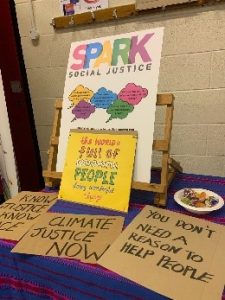 The diary has been released every Lent for over a decade, a longstanding collaboration between LCI and LCCT to shine a light on the important work of faith organisations in Leeds. Contributors were represented at the event, including SPARK social justice, the Joanna Project, Torch Trust, Space and Kidz Club, among many more.
The diary has been released every Lent for over a decade, a longstanding collaboration between LCI and LCCT to shine a light on the important work of faith organisations in Leeds. Contributors were represented at the event, including SPARK social justice, the Joanna Project, Torch Trust, Space and Kidz Club, among many more.